- Administrator
- Albums and Singles
 This "musical illustration" of the events occurring in the brain following a lethal stroke is a dramatic, chilling and emotional portrait. Musically, it is removed from anything else Nurse With Wound have done (even if it does touch on similar influences as the rest of Steve Stapleton’s body of work) as Bowers adds a more composerly hand to Stapleton’s surrealist drift. Bowers and Stapleton have crafted something unique that does not fit neatly into any categories, even amongst Nurse With Wound’s expanded horizons. This is draining, devastating and utterly compelling.
This "musical illustration" of the events occurring in the brain following a lethal stroke is a dramatic, chilling and emotional portrait. Musically, it is removed from anything else Nurse With Wound have done (even if it does touch on similar influences as the rest of Steve Stapleton’s body of work) as Bowers adds a more composerly hand to Stapleton’s surrealist drift. Bowers and Stapleton have crafted something unique that does not fit neatly into any categories, even amongst Nurse With Wound’s expanded horizons. This is draining, devastating and utterly compelling.
Bowers’ work in the medical field designing environmentally controlled rooms for operating theatres and medical imaging suites has added tremendously to the power of the piece. Listening to this from two different perspectives, firstly from that of an enthusiastic experimental music listener and secondly from my professional perspective as a neuroscientist reveals an impressive and moving synthesis of art, science and pathos. Concepts such as memory and disinhibition of neural networks are played out in the music; a warped sample of Mendelssohn’s "Wedding March" from A Midsummer Night’s Dream and the sound of children’s voices appear to represent the resurgence of memories in the minutes before death (possibly due to metabolic disturbances within the temporal lobes of the brain). The disrupted electrophysiological rhythms of the brain are represented in the discordant and tumultuous rhythms of Bowers’ playing.
Towards the end of the album, various permutations of "My Blue Heaven" are played, gasped and hinted at. The protagonist/patient/spirit promises to see loved ones (whether living or dead, we are unsure) in their blue heaven. The effect is moving and unsettling, my own memories at the loss of loved ones (albeit not from a stroke) emerging in the fabric of the music. While I have always found Nurse With Wound’s music to be enthralling on a number of levels, this is the first time I have ever felt Stapleton’s music to connect in such a powerfully emotional way. I have been frightened, entertained, humoured and provoked but never have I felt grief.
The weight of Rupture is crushing; this is not music to turn on, sit back and relax to. It is intrusive, captivating and mentally exhausting. Each time I listen to the album, I feel like another little part of me has changed. Aptly, the titles of the segments sum up not only the medical and physiological implications of a stroke but my feelings as a listener following this work: "A life as it now is, is not what it was, and will never be again."
samples:
 
Read More
- Administrator
- Albums and Singles
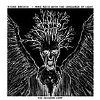 Two sides of a paranormal equation are presented in this cluster of songs. Decorated with primitive drums, avant drones, eclectic voices, and an array of stringed splendor, the two groups arrive at a meeting ground in the crossroads, with the arcane formulas of folk magic flowing down one street, and the poetic musings of a post-modern bard immersed in his lyrical wonderland on the other. Where one is ecstatic in the throes of Dionysian abandon, the other zones out into a haunted, rarefied Aethyr.
Two sides of a paranormal equation are presented in this cluster of songs. Decorated with primitive drums, avant drones, eclectic voices, and an array of stringed splendor, the two groups arrive at a meeting ground in the crossroads, with the arcane formulas of folk magic flowing down one street, and the poetic musings of a post-modern bard immersed in his lyrical wonderland on the other. Where one is ecstatic in the throes of Dionysian abandon, the other zones out into a haunted, rarefied Aethyr.
On the first side of this split 12" the group Stone Breath cauterized my wounded soul with the mythic sounds of their merrymaking. Playful and serious, reminiscent of wood elves and fey kicking around on some hand drums, banjos and dulcimer at a moonlit barn dance; the freshly painted hex sign above the wide double doors is charged by their sonorous vibrations, and the lunar light.
Of the three tracks the first is a slivered fraction of the two longer players. A brief line in a stanza, the lyrics are punctuated by deft finger picking. Resonant silver strings explode in a quick pattern that vanishes before its structure can be discerned, an experience both beautiful and terrible. "Scorpion Tears" shows off the highly focused ritual vocals which swerve back and forth from male to female, in a fiery dance. The deep male vocals are noble and assured and like a pink beam aimed at the third eye the words contain revelations. Where the second song is woody and deep, the third releases bright ripe notes. It feels racy and full bodied. "The Sky's Red Tongue" contains the same fast fingerpicking, but here the various guitars are dominant, whereas before the banjo was sustained in the foreground. Low whistles and flutes drone along, not quite trilling, a subtle bed the rest of the sounds swirl over. Until such a time as enough pressure is built up and the waters of the song poor over the spillway. Stone Breath manage to create songs that feel both decorous and informal. Good thing they have released a full length album, also titled The Aetheric Lamp and also out on Anti-Clock.
Stone Breath has a definite pagan quality, while Mike seed in contrast, is a touch more biblical, if not apocryphal. The second side, while being roughly around the same length of the first, feels a tad more substantial in that there are five songs, each of a medium length. Within them Mike Seed shows what he is capable of when he joins forces with the Language of Light. This guy has a seriously eerie voice and delivery style, but hey, I like eerie. As the first song, "Commit to Water," begins I hear the slosh and the slush of the stuff. An enervating, sourced-from-who-knows-what sound then appears, like a piece of driftwood to latch onto for survival, as Mike starts to extemporize on angels, Satan, and the soul.
"Rough Old Night" is my favorite song here, smack dab in the middle. The wormwood star makes an appearance in the lyrics for this one, as the narrator of the song rambles down to a desolate beach contemplating judgment day. The electronics lend it a favorable charm, dizzy oscillations power-surging at the right moments to embellish, with a moody punch, the darkness of the words. "Abraham's Guest" veers into bluesy terrain, with slurring slide guitar. Mike Seed sounds raspy and desperate, but resigned to his fate, which he finds in a deranged sputter of firework effects and the ominous beat of a dream. This fades seamlessly into the last number, an instrumental which offers reprieve, like a good friend giving shelter when it is most needed, protecting me from invisible forces who may not have my best interests in mind, sitting up with me until dawn when the madness goes away. A simple and elegant melody, on autoharp, dulicmer, or guitar. Does it really matter? It sounds wonderful and makes for a smooth finish.
Sorry, no audio samples. I don't have an easy way to transfer vinyl to digital.
Read More
- Administrator
- Albums and Singles
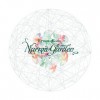 The year's first contender for top honors comes from violinist and composer Eyvind Kang. This new full-length on Ipecac sits among his major works, displaying a rare breadth of compositional talent, spectacular playing, and raw emotion.
The year's first contender for top honors comes from violinist and composer Eyvind Kang. This new full-length on Ipecac sits among his major works, displaying a rare breadth of compositional talent, spectacular playing, and raw emotion.
Eyvind Kang is a modern compositional giant who should require no introduction to the Brainwashed community. Kang has collaborated with avant-garde musicians ranging from Sunn O))) to Sun City Girls, and has contributed string arrangements to records by John Zorn, Mike Patton, Animal Collective, Bill Frisell, Laurie Anderson and Lou Reed (pre-Lulu). Most recently, his appearance on last year's Baroque Primitiva, by Alan "Alvarius B" Bishop, elevated that album from "very nice" to "essential." His solo recordings span well over a dozen full-lengths in 15 years, with highlights including Athlantis, The Yelm Sessions, and an Ipecac album smeared by (surprise!) Patton's divisive croon: Virginal Co Ordinates, which I very strongly feel is Kang's best album. Until now, that is.
Kang is at the very top of his game on The Narrow Garden, at a lean seven tracks and 37 minutes with no filler. Opener "Forest Sama'i" functions as a grand prelude, launching the album on a melodic, playful note. Kang recorded The Narrow Garden in Barcelona with an ensemble cast of 30 musicians, and on pieces like "Forest Sama'i," the group effort shines. Grounded by a Middle Eastern-derived melody, accented by meticulous woodwinds and strings (including Kang's violin), the song speeds its tempo near the end to stirring effect. "Pure Nothing" recalls Kang's collaborative LP with Jessica Kenney, Aestuarium, reissued last year on Ideologic Organ. Here, Kenney sings as if from a church hymnal, her angelic vocals floating across a classical soundscape, rich with quivering strings, as she cries out with pseudo-naïveté: "I cannot say whether I am asleep or awake / somebody tell me."
Led by the cries of seagulls at the start of "Usnea," a stormcloud of eerie atmosphere hovers onto the scene. The mood shift from "Pure Nothing" to "Usnea"—from Kenney's cloudbusting vocals into queasy dread—is perfect in its execution. The wall of Dolby THX-worthy, droning maelstrom eventually cedes to a couple of lingering woodwinds, dancing in the aftermath of the storm, transitioning into "Mineralia" at the album's midpoint. Kenney returns for a few operatic lines in what sounds like Latin, her singing this time hushed, drawn inward; she is overtaken by lush melodies that recall those of "Forest Sama'i" as the piece evolves. The spacious, relaxed tone foreshadows the title track, which is far more harsh and claustrophobic.
"The Narrow Garden" echoes the slow-building unease of "Usnea," with its chorus of stringed instruments lingering just long enough on individual, discordant clusters of notes to keep one's breath held tightly. "Nobis Natalis" clears the air to nice effect, spotlighting Kenney's vocals for a minute-long encore performance—and providing a palate cleanser before the album's strongest (and closing) statement, "Invisus Natalis." Cinematically evoking an array of natural imagery—birds, plants, flowers, water and so forth—Kang's melodies dance and twist about with ease. Over time, the song builds to a climax; violence is imminent, implied by the awesomely tense arrangement that steamrolls into film score-worthy drama, then unexpectedly drops out in a flicker of static.
Engaging from start to finish, The Narrow Garden is a strong contender for Eyvind Kang's best, and undoubtedly ranks among his high water marks as a recording artist. Its songs take real risks, skipping from Arabian and Middle Eastern melodies, to traditional Asian folk music, to Baroque and European classical composition. Envisioned and set into motion by one of today's sharpest composers, impeccably arranged, flawlessly played, beautifully produced: I cannot conceive of any way to improve upon Kang's stunning achievement on The Narrow Garden.
Samples:
Read More
- Administrator
- Albums and Singles
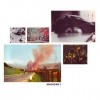 Loops of Your Heart is Axel Willner, better known as The Field for his three albums to date on Kompakt. His debut full-length under this new moniker sets aside the minimal techno formulae of his primary guise for a far more ambient experience. Unfortunately, he discards many of the distinct characteristics of The Field in the process, downplaying his established strengths.
Loops of Your Heart is Axel Willner, better known as The Field for his three albums to date on Kompakt. His debut full-length under this new moniker sets aside the minimal techno formulae of his primary guise for a far more ambient experience. Unfortunately, he discards many of the distinct characteristics of The Field in the process, downplaying his established strengths.
Like many side projects and alter egos before him, Loops of Your Heart sounds like a venture for Willner to explore ideas that he deems a bit too left-field for The Field's albums. His debut song released under this name was "Riding the Bikes," available for mass consumption on Kompakt's Pop Ambient 2012 compilation (also out this week). That track's echoing, looped guitar sounded not unlike a lost Vini Reilly piece; with no beats to speak of, it was a far cry from Willner's work as The Field. "Riding the Bikes" provided a glimpse of where Willner has now moved on his full-length as Loops of Your Heart, And Never Ending Nights. It's certainly not all Durutti Column-esque guitar (in fact, there's hardly any guitar on the album), but there are several hard experiments throughout. Nearly the entire album is looped ambience, occasionally backed by throbbing synth lines better described as "pulses" than "beats."
The opening "Little You, You Should Develop," with its gritty, two-note bass line hinting at an underlying rhythm, would not have sounded out of place on The Field's latest album, Looping State of Mind. However, the track's title is a glimpse into Willner's state of mind—a plea to his own muse, perhaps, to push forward into more experimental territory. And push forward he does: "Broken Bow" decries any hint of a minimal techno beat for its initial five minutes, abstract synth tones stabbing through a barren wasteland of drone, before a pitter-pattering pulse sneaks into the mix about halfway through. "Neukölln" is all spaced-out, sweeping strokes, with just a hint of melody and no beat in sight—not a far cry from Daniel Lopatin's early records as Oneohtrix Point Never. The wide-ranging samples scattered throughout The Field's albums are mostly absent; the sounds on this album, even when looped back onto themselves ("Cries"), sound organic, and are not recognizable from popular sources.
There are hints of Willner's day job scattered throughout, like the fluttering tones of "End," but the prevailing mood is less oriented toward the dancefloor, and more toward late-night reflection. Still, it is difficult to shake the feeling that And Never Ending Nights often sounds like a vehicle for Willner to sift through new ideas before his next major statement. I can picture a Field track like "Then It's White," the most outlying experiment on Looping State of Mind, coming from the same recording sessions as this album. At the end of the day, The Field's work is far more distinct, given that Willner has perfected his formulae three albums in, and is essentially making careful refinements at this point. And Never Ending Nights is pretty and occasionally memorable—like the heartstring-tugging coda to "Cries," the album's peak—but doesn't match the high quality and originality of Willner's albums as The Field.
Samples:
Read More
- Administrator
- Albums and Singles
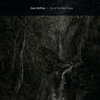 This English guitarist's first full-length is just as impressive as last year's excellent Brown Bear EP, but displays quite a significant and somewhat unexpected evolution.  Rather than playing up the psychedelic touches and constant sense of motion that made his earlier work immediately gratifying, Dean has taken the more difficult and distinctive road of shifting his emphasis more strongly towards space and decay.  Thankfully, his melodies are usually strong enough to support that potentially perilous decision.  As a result, Son of the Black Peace is as much a bold artistic statement as it is a great album.
This English guitarist's first full-length is just as impressive as last year's excellent Brown Bear EP, but displays quite a significant and somewhat unexpected evolution.  Rather than playing up the psychedelic touches and constant sense of motion that made his earlier work immediately gratifying, Dean has taken the more difficult and distinctive road of shifting his emphasis more strongly towards space and decay.  Thankfully, his melodies are usually strong enough to support that potentially perilous decision.  As a result, Son of the Black Peace is as much a bold artistic statement as it is a great album.
The one thing that most fascinates me about Dean McPhee is that his style is so difficult to deconstruct: he isn't doing anything ostentatious or overtly experimental, but there is no clear chain of influences leading to his sound.  There are definitely some subtle nods to Takoma Records, jazz, and contemporary pedal-stomping experimentalists, but Dean seems to built upon their tactics rather than their content.These four songs sound like traditional folk-inspired steel-string instrumentals that have been electrified, softened, slowed down, blurred, and improvised into something new.
McPhee is quite adept at weaving strong melodic motifs, as he proves with both the opening harmonic reverie in "Power of Nines" and the Eastern-inspired central riff of "Golden Bridge," but the true depth of his artistry is a bit deeper and less immediately apparent.  Dean wields his battery of pedals in a remarkably nuanced and ingenious way, using delay and chorusing to keep notes hanging and shimmering in the air like a fog.  That nimbus of gently quivering decay holds the pieces together (kind of like drone music) and eliminates the need to stay busy or play a lot of notes just to keep the songs' momentum going: Dean is clearly trying to bring as much sensitivity and feeling to his notes as possible.  He wants them to matter.
Well, perhaps not quite all the time, as another great facet of this album is that almost everything McPhee does is essentially a fantasia on a theme.  The basic framework of these pieces is often merely a jumping-off point for endless variations and improvisations.  That tendency could be quite tedious in the wrong hands, but Dean has a knack for deftly and unexpectedly locking back into the melody in a tight and oft-striking way.  At times, I wish he would stick a bit closer to the song's core (particularly when there is an especially likable melody), but I still enjoyed the low-level tension of wondering how he is going to pull things back together.  He even managed to surprise me a bit near the end of "Cloud Forest," as he wields feedback in a way that weirdly approximates a singing saw (while still maintaining a skeletal chord progression, no less).
Notably, this album was recorded in single takes with absolutely no overdubbing (apparently in a single afternoon, even), yet it sounds like the end result of a lengthy and painstaking process of distillation.  In fact, Son of the Black Peace feels like such a product of restless and exacting perfectionism that it seems like it only could have been recorded in this fashion–it needs  that organic, spontaneous feel as a counterbalance to make it all work (which it certainly does).  Some of McPhee's artistic decisions (increasingly abstract divergences, fewer attention-grabbing "set pieces," etc.) make this album a bit less immediately accessible than its predecessor, but it is worth the effort to get past that.  I'm admittedly a little concerned about how dangerously close Dean is to crossing the line between "refreshingly reflective and understated" and "languidly meandering," but he is staying on the right side pretty damn consistently at the moment (it helps that he keeps his releases somewhat brief though).  If it finds its way to enough ears, this masterful and subtly mesmerizing effort should quietly ensconce McPhee in the upper echelon of contemporary solo guitarists (which is exactly where he belongs).
Samples:
 
Read More
- Administrator
- Albums and Singles
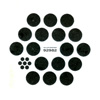 It seems that I badly underestimated William Basinski, as I stopped following his career several years ago out of frustration with his apparent creative stagnation.  His methods and conceptual underpinnings have certainly evolved steadily, but it seemed like the end result was always something murky, free-floatingly melancholy, and endlessly repeating, regardless of how he got there.  Then I heard this 2009 album and was unexpectedly floored.  Basinski seems to have found whatever it was that he was missing.
It seems that I badly underestimated William Basinski, as I stopped following his career several years ago out of frustration with his apparent creative stagnation.  His methods and conceptual underpinnings have certainly evolved steadily, but it seemed like the end result was always something murky, free-floatingly melancholy, and endlessly repeating, regardless of how he got there.  Then I heard this 2009 album and was unexpectedly floored.  Basinski seems to have found whatever it was that he was missing.
Or maybe he had it and lost it.  It is difficult to say, as the first three pieces here were all recorded way back in 1982.  All on the same night, actually, which is where the album derives its seemingly cryptic title (the fourth piece is a recent composition using the same source material).  Curiously, the nearly-as-excellent Vivian & Ondine (also from 2009) similarly cannibalized old compositions to great success.  At the very least, William definitely seems to be extremely adept at choosing what to revisit and release these days.  Obviously, such tactics are nothing new for Basinski (artfully re-purposing his past work is arguably the basis for his entire career), but 92982 differs from his other "recent" work in some very subtle, yet very important ways.  Naturally, the closest touchstone for these lengthy, slow-moving ambient washes of distressed and damaged tape loops is William's career-defining Disintegration Loops series.  At the risk of sounding heretical, I would say that he easily surpasses that high-water mark here.  In any case, he has certainly found a way to make his work in that vein more engaging.
Being a William Basinski album, 92982 is characteristically still pretty blurry and suffused with sadness, but the loops have a bit more of a distorted physicality than usual.  That seems like such a minor difference, but it gives the pieces a heightened presence–there's some definite heft and grittiness here that I usually find lacking in William's work.  The other, more unexpected, innovation is that Basinki recorded the original tapes with the windows open in his studio.  I can't possibly overstate how vital that seemingly trivial quirk is to the success of these pieces: it changes everything.
In the most obvious sense, the ambient Brooklyn sounds (sirens, helicopters, fireworks,etc.) that subtly drift in and out of the fog make everything seem a bit more unpredictable, mysterious, and dynamically satisfying.  The pieces are no longer mere haunting loops that glacially wax and wane for twenty minutes, but instead feel like thoughtful compositions with unconventional crescendos ("Shhhh...here comes the ambulance–this is my favorite part!").  Less obviously, allowing the sounds of the world outside to seep into the music also makes it seem much more organic and alive.  Most important of all, however, is this: on a deeper level, having such a sense of place and time makes 92982 feel like an extended love song/elegy for both a city and an entire era of Basinski's life.  They don't just sound good–these pieces have some serious emotional resonance of the "bittersweetly heartbreaking" variety.
In a way, 92982 is a perfectly realized collision between The Disintegration Loops and John Cage's "4'33"."  It narrowly misses being a perfect album though, as it arguably would have been better if it had ended after the achingly beautiful and gently swaying first half.  The argument: I'm a bit conflicted by the third piece, "92982.4," simply because it doesn't feel like it relates thematically to the pieces that precede it.  Taken by itself, however, it is quite good (if a bit overlong): a fragile, dark, and tirelessly repeating piano loop unfolds for 20 minutes as the accumulated overtones oscillate and clash uncomfortably below it.  It sounds like either a sun-warped Morton Feldman record or one of Erik Satie's nightmares.  The closing "new" piece is deeply exasperating though, as it is essentially just a sterilized version of the opening piece with all the hiss, grit, and life removed.  It's still a fine composition, but the fact that Basinki made an ill-advised cosmetic "improvement" upon something that was already perfect makes me wonder if he fully understands and appreciates what a stellar album his brilliant 1982 self made.
Samples:
 
 
Read More
- Administrator
- Albums and Singles
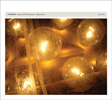 Craig Tattersall and Andrew Hargreaves are The Boats, a UK duo that have an exceptional ability to mix abstract electronics, shoegaze drones, and jazz-influenced acoustic drumming into a singular work that sounds like no one else. The small symphonies and genre hopping on here are simply brilliant and unique.
Craig Tattersall and Andrew Hargreaves are The Boats, a UK duo that have an exceptional ability to mix abstract electronics, shoegaze drones, and jazz-influenced acoustic drumming into a singular work that sounds like no one else. The small symphonies and genre hopping on here are simply brilliant and unique.
On the four 10+ minute ballads that make up this album, the duo is joined by cellist Danny Norbury, which is often the one sonic constant throughout.While piano, guitar, and drums are used on almost every track, they’re often so heavily treated or modified that they bear little resemblance to their source.
What makes this all the more impressive is that The Boats mostly avoid complex DSP plug-ins and other studio processing tricks and instead use more physical strategies:well worn analog tape gives a beautiful sonic haze that the most complex MAX/MSP patch would have problems modeling.The analog cloud that covers the entire album is one of its greatest assets.
Opener "The Ballad for Achievement" begins with fuzzed out waves of sound, ebbing and flowing atop obscured melodies, resulting in a warm, inviting dissonance.Eventually the melodies break through heavy vinyl surface noise and transform into rich cello and piano passages, bringing in bells and drums in the later moments.
The cello and piano duets form the foundation of "The Ballad for the Girl on the Moon," augmented with some subtle electronics that come and go, but eventually yield for drums.In the second half, the drums and melody goes from organic to synthetic, stripped away and replaced with Casio-like synth tones and brittle drum programming.
"The Ballad of Failure" differs in its inclusion of vocals, and when combined with the guitar and percussion (initially insinuated rhythms, then actual drums) starts to resemble an extremely abstract ambient take on shoegaze.The gauzy sounds and weather-worn surface convey a clear warmth throughout, even when the more conventional moments take a backseat to electro-acoustic experimentations midway through.
Album closer, "The Ballad of Indecision," also features vocals, this time female and Japanese by Cuushe, and thus rather different from the male voice of Chris Stewart from before.Her delicate, frail vocals are accompanied by electronic sounds at first, which evolve into an organic, cello-led passage that eventually transforms again.With the addition of microscopic electronic beats, it goes back into electronica realms.
This is the first I have heard from The Boats, and I came away feeling quite impressed.The way they shape fuzzy, textural abstractions into actual songs is wonderful, bouncing from convention to experimentation with nary a hesitation.I have heard many an album that has fascinating noises and tactile textures, but few manage to use them in actual songs, which is what I found so superlative about this record.
samples:
 
Read More
- Administrator
- Albums and Singles
 In their third collaboration, Christian Fennesz and Ryuichi Sakamoto go for a more conceptual approach: Sakamoto recorded 24 piano improvisations to open concerts during a Japanese tour, each within a different key. These 24 pieces were then handed over to Fennesz, who added his touch to them. The result is a compelling, if sprawling, work of gentle improvisation.
In their third collaboration, Christian Fennesz and Ryuichi Sakamoto go for a more conceptual approach: Sakamoto recorded 24 piano improvisations to open concerts during a Japanese tour, each within a different key. These 24 pieces were then handed over to Fennesz, who added his touch to them. The result is a compelling, if sprawling, work of gentle improvisation.
The 24 pieces, and roughly 2 hours of music, follow similar blueprints:Sakamoto’s piano playing usually appears unmasked, or only slightly processed, up front, while Fennesz adds additional layers of guitar, electronics, or further abstractions of the piano.Like 2007's Cendre, the piano is the focus, although here that seems even more so.
This does vary somewhat throughout the individual tracks, however."0318" is clear piano notes creating ripples in a shimmering pool of sound initially, but as the piece evolves, the more abstract electronic instrumentation takes hold.Dissonant sounds, including the unmistakable buzz of a guitar cable, vie for attention on "0328," even if the piano often wins out.
While the piano tracks tend to be untreated, there are moments where digital processing commands even more attention.On "0319" and "0409," Fennesz transforms the piano sounds drastically, reshaping it into a thin, digital voice on the former and an almost xylophone like resonance on the latter.The result is more memorable and distinct tracks, and I personally wish there would have been a bit more of this strategy employed.
Fennesz's penchant for tangible atmospheres shows on "0320," which has all of the trappings of a late-summer lakeside sunset, a mood he is unparalleled at creating.He also reiterates a bit of his glitch-tinged past on "0325" and "0401," where the piano is enshrouded by noticeable, but tasteful layers of sonic grime.
I found myself actually drawn more towards the primarily acoustic pieces that are here, such as "0411," in which the synthetic parts are almost imperceptible, replaced by untreated guitar and strings that have a lot of breathing room around them, allowing a greater amount of subtlety to come through.
This album's greatest weakness is its length, however.The previous collaborations were an EP and a tidy album, respectively, so being spread across two discs, the pieces tend to blend together.Taken as individual albums, or a few tracks at a time, the rewards are much more significant.Fennesz's recent Seven Stars EP was an evolution to a more "song" oriented place, while here his work is more fragmented and oblique. It works but it doesn’t grab me as strongly.
Flumina fits nicely in with the prior two collaborations of the duo, blending Sakamoto's subtle piano improvisations with Fennesz's careful additions.While I personally prefer the more song-oriented direction Fennesz has been toying with, his abstractions work well here, balancing the organic piano notes well.Taken in small doses, this is a great disc, but in a marathon listening session, the impact is lessened.
samples:
 
Read More
- Administrator
- Albums and Singles
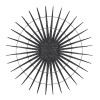 This archival release, captured live in Philadelphia, is a valuable companion piece to the previous Bardo Pond and Tom Carter session, 4/23/03, which was originally released on CD nine years ago, and is receiving a vinyl reissue this week. It is a joy to hear another side of Carter and Bardo Pond playing together, this time in a live setting.
This archival release, captured live in Philadelphia, is a valuable companion piece to the previous Bardo Pond and Tom Carter session, 4/23/03, which was originally released on CD nine years ago, and is receiving a vinyl reissue this week. It is a joy to hear another side of Carter and Bardo Pond playing together, this time in a live setting.
Bardo Pond's mile-wide discography is a fan's dream (or a bit of a nightmare—depending on prices and availability), overflowing with live recordings, side projects, one-offs, compilation tracks, and other miscellanea. As such, the band has never shied away from collaboration. Their history with experimental guitarist Tom Carter can be traced back to 1997's Harmony of the Spheres, an essential document of '90s psychedelia, which aligned the Bardos with a handful of like-minded explorers, including Carter's primary musical outlet, Charalambides. A few years down the line, Carter—who was then living in Austin, Texas, but in the midst of a string of Philadelphia shows—stopped by the Bardos' studio space, the Lemur House, where he and the band proceeded to grind out an album's worth of improvisational psych-rock, released as 4/23/03 the following year.
Recorded two days after the Lemur House studio sessions (hence the title), 4/25/03 is just now seeing the light of day. While not a 100% essential purchase for casual fans of either Bardo Pond or Carter's work with Charalambides, this disc functions as a fine supplement to its elder cousin. Carter's chemistry with the five-piece band is apparent; in fact, he gels so perfectly that it is sometimes difficult to distinguish his playing from that of the Bardos' guitarists, John and Michael Gibbons—both a compliment and a curse. The closest parallel in the Bardos' discography is their mid-'90s collaborative work with Roy Montgomery, which resulted in two albums under the name Hash Jar Tempo. Which lineup you prefer is most likely a matter of whether you enjoy Carter or Montgomery's guitar style more. (Really, though, there's no need to take sides—I'll enjoy both, thanks.)
4/25/03 was recorded live by psych/drone/metal connoisseur Scott Slimm at Philadelphia's Tritone Bar. Both pieces—the main set, and the encore performance—are untitled. The first stretches well over 40 minutes, and takes its time finding a groove. This is by no means a bad thing, as both the Bardos and Tom Carter are adept at pacing in their improvised work, allowing the music to ebb and flow, evolving slowly without rushed changes in mood. With Carter present, the mix is a lot thicker with guitars than the marvelous Bardo live document 4.3.06, put to tape by Slimm three years later for his now-defunct (and sorely missed) Archive label.
The main set begins with Carter's sparse guitar lines, then carefully folds in two more guitars as well as bass, electronics, and drums, building to a miniature crescendo by 12 minutes. Then, just as naturally, the layers of noise peel away, and the heady jam devolves into drone and muted feedback by its halfway point. Bardo vocalist Isobel Sollenberger's wispy, stoned vocals make an appearance as the music subsides; when she begins her flute incantations at the 30-minute mark, the band takes it as a cue to pick up steam (and volume). Carter's guitar stylings blur into a mess of swirling, frenzied strumming, with the band around him locked in a rhythmic groove, blanketed with distortion. After a few minutes in top gear, the musicians downshift and allow the music to fade back again. As the volume drops, a couple premature shouts and cheers sneak out from the crowd—"WOO!"—their enthusiasm palpable.
The encore performance is distinctly more laid-back and peaceful, forgoing the monstrous peaks and valleys of its predecessor. It also clocks in at a more manageable 20 minutes. This is a smart combination of mood and length—an effective chaser to the roller-coaster the crowd just endured, which sounds exhilarating, but was likely a bit exhausting in a live setting. For the encore, the Bardos and Carter maintain a steady, relaxed tempo and allow Sollenberger's flute séance to take center stage, weaving through the empty spaces like a snake in the grass. The tonal variety between the two pieces is distinct, and accentuates one of the great things about Bardo Pond and Tom Carter: their masterful range of sounds, both apart and together, is among the widest in modern psychedelic music.
Samples:
Read More
- Administrator
- Albums and Singles

NURSE WITH WOUND • GRAHAM BOWERS: Rupture
DPROMCD93
This CD is the first collaboration of Steven Stapleton's Nurse With Wound and composer/sculptor Graham Bowers. It is, without doubt, one of the best things we have ever released. It's an extremely unnerving, but also hauntingly moving listening experience.
The work is an attempt to create a musical illustration of the "goings-on" in the brain during the last hour and three minutes of a life after suffering a major stroke. It is multi-layered and is primarily concerned with the internal chaos caused by the loss of control of thought processes, responses and consequential actions, with all types of incoherent disjointed memories and present real time events - as well as moments of lucidity, panic and fear - clashing, merging and evolving.
It's essentially one long piece, but is presented in three parts:
1. "...a life as it now is,
2. ...is not what it was,
3. . ...and will never be again"
It arrives packaged in a beautiful 6 panel gloss laminated digipak, featuring artwork from both Babs Santini and Graham Bowers. The edition is limited to just 1000 copies in this format.
More information here.
Read More
- Administrator
- Albums and Singles
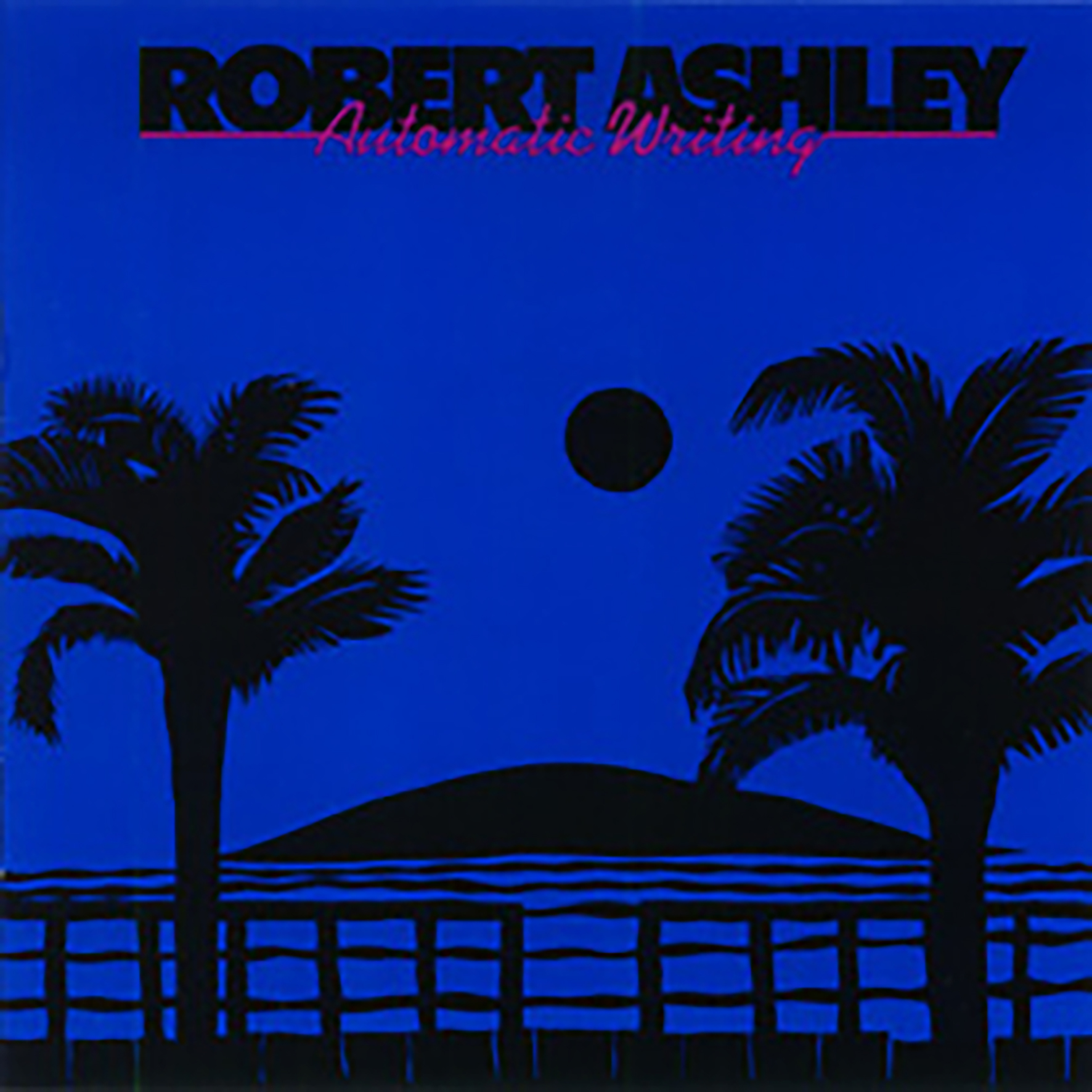 Earlier this year, Lovely Music reissued Robert Ashley’s 1978 landmark Private Parts album and now along comes its follow-up: 1979's similarly groundbreaking and idiosyncratic Automatic Writing. On its surface, this album remains a haunting and uneasily dreamlike affair, as it anticipated both ASMR and the evolution of ambient music by several decades and still sounds improbably contemporary today (or perhaps just too singular to feel like it belongs to any era at all). Beneath the surface, however, lies something far more fascinating and deeply conceptual than mere ambient music (or most late 20th century modern composition, for that matter): Automatic Writing is the culmination of Ashley's experiments in using his mild form of Tourette's Syndrome as a compositional tool. Unsurprisingly, making such a quixotic endeavor work proved to be quite a challenging and oft-exasperating undertaking, but Ashley's five years of trial and error ultimately resulted in one hell of a strange and memorable album.
Earlier this year, Lovely Music reissued Robert Ashley’s 1978 landmark Private Parts album and now along comes its follow-up: 1979's similarly groundbreaking and idiosyncratic Automatic Writing. On its surface, this album remains a haunting and uneasily dreamlike affair, as it anticipated both ASMR and the evolution of ambient music by several decades and still sounds improbably contemporary today (or perhaps just too singular to feel like it belongs to any era at all). Beneath the surface, however, lies something far more fascinating and deeply conceptual than mere ambient music (or most late 20th century modern composition, for that matter): Automatic Writing is the culmination of Ashley's experiments in using his mild form of Tourette's Syndrome as a compositional tool. Unsurprisingly, making such a quixotic endeavor work proved to be quite a challenging and oft-exasperating undertaking, but Ashley's five years of trial and error ultimately resulted in one hell of a strange and memorable album.
This reissue restores Automatic Writing to its original vinyl form, excising the two additional pieces that were added for 1996's CD reissue.Part of me is a bit disappointed by that, as I quite like both of those shorter works, but vinyl can only hold so much and something had to go.Aside from that practical reason, however, "Automatic Writing" benefits greatly from being presented as a stand-alone piece, as it is a deliberately meandering and understated mélange of mumbles, whispers, and barely-there organ melodies.As such, the spell it casts is a very delicate and precarious one, making it extremely susceptible to being overpowered by any more focused and intense accompanying material (a category that definitely applies to previous bonus track "Purposeful Lady Slow Afternoon").
Obviously, there is a lot of music in the world that can reasonably be categorized as "dreamlike," but almost none of it takes that challenge quite as literally as Ashley did with "Automatic Writing."It is not an exaggeration to say that this album evokes the uneasily intimate feeling of eavesdropping on Ashley as he talks in his sleep, but there is also a bit more to the experience as well.For example, there is also a whispering French woman in the room.Notably, that woman (Mimi Johnson) was Ashley's real-life wife and, moreover, her words are a newly sensuous translation of Ashley’s own murmured stream-of-subconsciousness.Also of note: Ashley viewed the piece as a wildly unconventional opera of sorts with a cast of four characters (the other two "characters" being a wandering church organ melody and "Moog synthesizer articulations" that resemble tin cans being scraped in a way that loosely mimics speech).A curious fifth element exists as well, as a buried rock groove lazily wanders in and out of the piece, mimicking the intrusion of distant party sounds from a neighboring apartment.
The piece never evolves into anything more than that, but it does not need to, as it is a pleasantly absorbing and enigmatic listening experience as long as it lasts.For those looking for a deeper meaning, however, there is an accompanying lyric sheet that arguably provides a Rosetta Stone for Ashley's mostly unintelligible murmurings.For the most part, it is a fragmented and impressionistic flow of words that approaches poetry at times and makes repeated references to sadness, falling, sensory overload, drowning, floating, and varispeed (a recording feature used to manipulate time and pitch).In his original liner notes, Ashley notes that he was in a deep depression at the time due to the world's indifference to his work and that mental state certainly seems to tenaciously bleed into his unconscious monologue again and again.In hindsight, some of Ashley's woes as a young composer are grimly funny ones, as his attempts to replicate involuntary speech in his live performances were apparently met with legal actions from promoters accusing him of drunkenness.It sounds like Ashley was also alienated from his peers though, which must have been quite hard–he makes references to "rumors" and ruefully describes himself as "the person you would cross the street to avoid."That feeling is what ultimately drove Ashley to present his involuntary speech as the core of this "opera," as wanted to portray such a person as one who deserves sympathy.Whoever transcribed that speech deserves sympathy as well, as the involuntary speech on Automatic Writing is the real deal rather than an imitation (Ashley finally managed to capture some authentic recordings of that state over a summer break in a Mills College recording studio).
I am relieved and heartened that Automatic Writing ultimately found an audience and that Ashley went on to be a deservedly influential figure, as he went through absolute hell to make this album and got quite a dose of the crushing loneliness that comes with being too far ahead of one's time (see Julius Eastman's career for an example of a considerably darker ending).As much as I like Automatic Writing, however, it is not nearly as strong as Private Parts (though I do prefer it to all of the more polished work that followed).Taken as a pure listening experience, "Automatic Writing" is appealingly immersive and unique, but it is primarily the backstory and the process that make it so compelling.Aside from straining to plumb the depths of his subconscious mind to harness its creative power, Ashley also made very inventive and radical use of both electronics and language, employing "reactive computer circuitry" and purposely modulating his voice into incomprehensibility.His hypothesis was that "rhythm and inflection could convey meaning" even if the words themselves did not make sense.He was probably right about that, but the finished piece would not work nearly as well if he had not had the additional stroke of genius to mirror his inscrutable murmurs with a woman's voice breathily echoing him in articulate French.Moreover, when all of Ashley's bold decisions are added together, it is not hyperbole to say that he willfully abandoned almost the entire accumulated wisdom of the Western musical tradition: he made muddled human speech his focus and boldly relegated melody, structure, and rhythm to distracted supporting players that wander in and out of the scene without consequence.Even if this album were not successful, I would very much admire Ashley's iconoclastic vision.Fortunately, the experiment went remarkably well.While Ashley's extreme constraints prevent this album from quite reaching the same heights as Private Parts, he undeniably transcended his self-imposed hurdles far more impressively than anyone could have ever predicted.
Sample:
Read More


